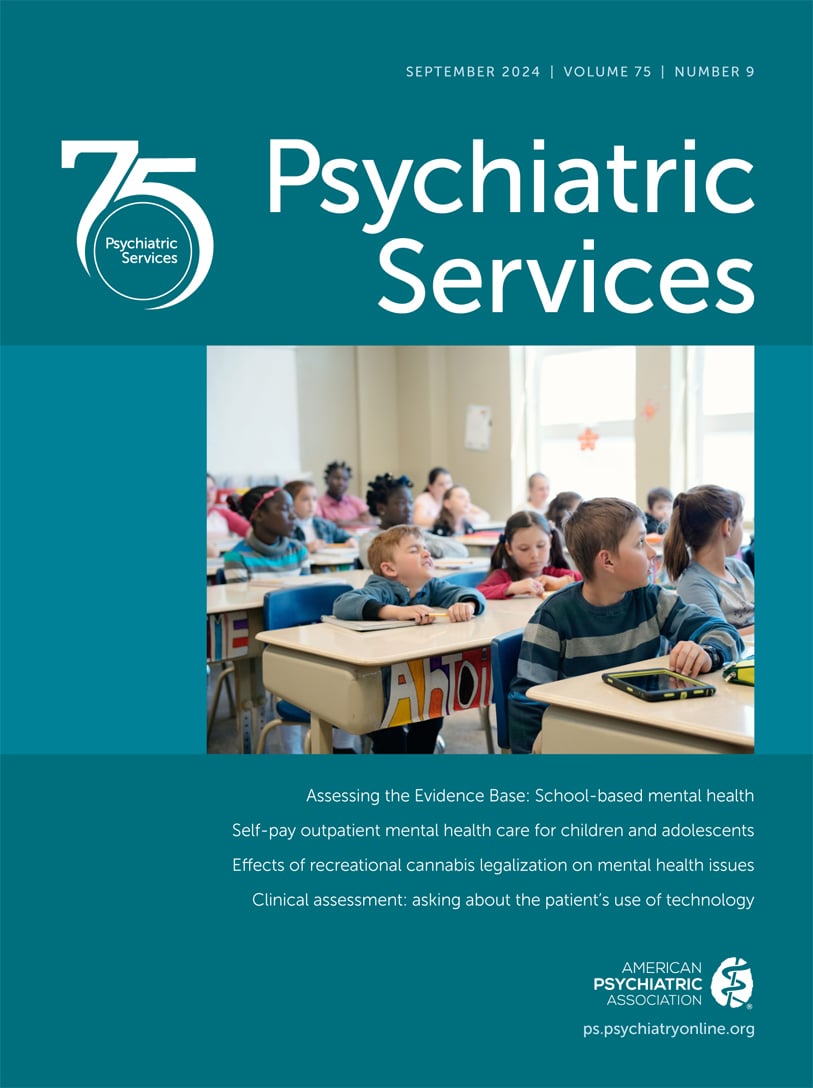Psychiatric Services
- Volume 47
- Number 7
- July 1996
Article
Publication date: 01 July 1996
Page684In an item about the 1996 Institute on Psychiatric Services on page 545 of the May issue, it was erroneously stated that this will be the first year in which the institute will offer continuing education credit for disciplines other than psychiatry. Such ...
https://doi.org/10.1176/ps.47.7.684Publication date: 01 July 1996
Pages709–713OBJECTIVE: This study examined differences in outcomes, alcoholism treatment utilization, and costs between alcoholic individuals with no previous treatment history who chose to attend Alcoholics Anonymous (AA) or to seek help from a professional ...
https://doi.org/10.1176/ps.47.7.709Publication date: 01 July 1996
Pages714–720OBJECTIVE: The study compared the social environment of a conventional psychiatric inpatient setting with that of a combined acute day hospital and crisis respite program that functions as an alternative to hospitalization for patients judged appropriate ...
https://doi.org/10.1176/ps.47.7.714Publication date: 01 July 1996
Pages721–726OBJECTIVE: The reorganization in 1981 of a general hospital psychiatric ward in Oslo, Norway, to achieve a more suitable treatment milieu for patients with schizophrenia resulted in a change in patients' perceptions of the ward atmosphere. Reduced group ...
https://doi.org/10.1176/ps.47.7.721Publication date: 01 July 1996
Pages727–730OBJECTIVE: The presence and effects of delirium among psychiatric patients are not well understood. This study investigated incidence rates and risk factors for delirium among hospitalized psychiatric patients. METHODS: The charts of 199 patients admitted ...
https://doi.org/10.1176/ps.47.7.727Publication date: 01 July 1996
Pages731–736OBJECTIVE: The study examined two-year housing outcomes of homeless mentally ill clients who took part in an experimental investigation of supported housing. The relationships between housing outcomes and client characteristics, such as gender, ...
https://doi.org/10.1176/ps.47.7.731Publication date: 01 July 1996
Pages737–743OBJECTIVE: Case management was seen as the major strategy for integrating mental health, housing, and social supports for clients in the Robert Wood Johnson Foundation Program on Chronic Mental Illness, a five-year multisite demonstration project designed ...
https://doi.org/10.1176/ps.47.7.737Publication date: 01 July 1996
Pages744–750OBJECTIVE: The study examined differences in outcomes for patients with schizophrenic disorders who were receiving assertive community treatment based on whether their families were involved in their treatment more intensively in psychoeducational ...
https://doi.org/10.1176/ps.47.7.744Publication date: 01 July 1996
Pages751–754OBJECTIVE: The study evaluated the effects of using the principles of total quality management (TQM) to reduce aggressive incidents in the dining rooms at a state forensic hospital. METHODS: A ten-member, multidisciplinary team, which included a patient ...
https://doi.org/10.1176/ps.47.7.751Publication date: 01 July 1996
Pages755–757To examine responses to the psychological needs of adolescent injury victims, the records of all adolescents hospitalized at an urban trauma center during a one-year period for injury by gunshots, stabbings, and physical assaults (N = 59) were compared ...
https://doi.org/10.1176/ps.47.7.755Publication date: 01 July 1996
Pages757–759The study assessed one-year outcomes for 110 clients with serious mental illness who were randomly assigned to an assertive community rehabilitation program that provides psychiatric rehabilitation services in community settings or to hospital-based ...
https://doi.org/10.1176/ps.47.7.757Publication date: 01 July 1996
Pages760–761To determine how users of mental health services would like to be addressed by professionals, a survey of 302 persons participating in a variety of inpatient and outpatient psychiatric programs was conducted. Forty-five percent of the sample preferred the ...
https://doi.org/10.1176/ps.47.7.760Publication date: 01 July 1996
Pages762–763Although epilepsy-related violence can occur, accounts of criminal behavior caused by epilepsy remain rare and unconvincing. The authors describe a case of apparent postictal aggression, resulting in felony assault charges, by a patient who had nocturnal ...
https://doi.org/10.1176/ps.47.7.762Article
Article
Article
Past Issues
View Issues Archive
Vol. 75 | No. 12

Vol. 75 | No. 11

Vol. 75 | No. 10
